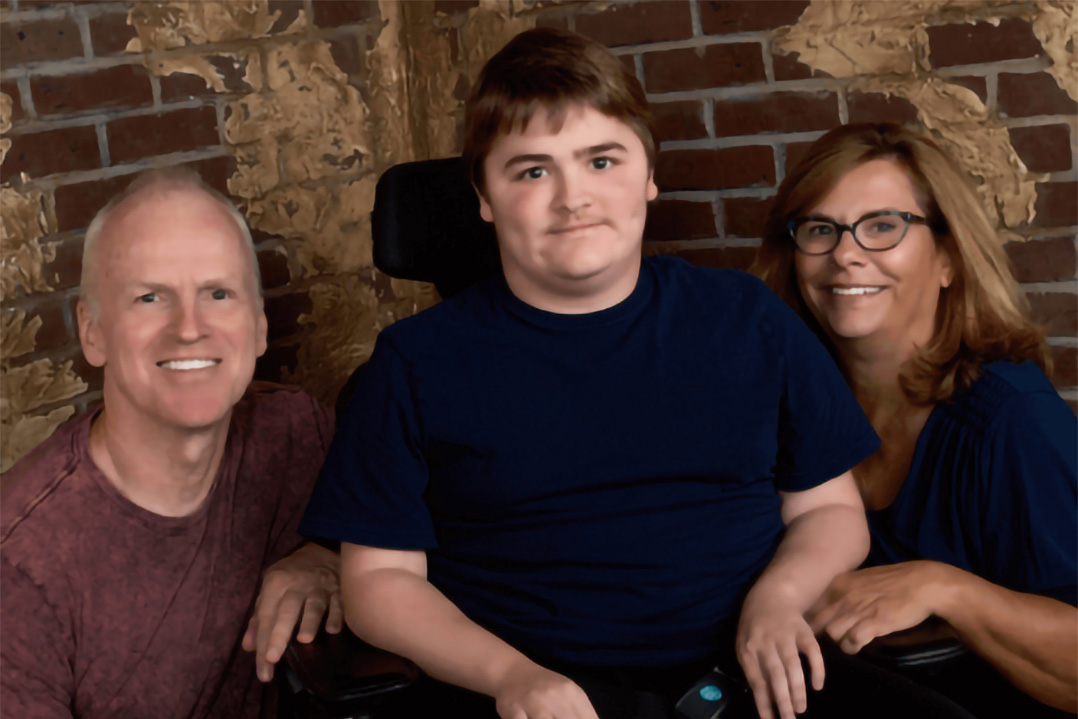Mindy Cameron didn’t find out her son, Christopher, had Duchenne muscular dystrophy until he was 2 years old, a devastating diagnosis that changed the trajectory of both of their lives.
The rare genetic disorder leads to progressive muscle degeneration, meaning as children with DMD grow, they slowly lose mobility and independence and experience cardiac and pulmonary deficits. There is no cure, but medical advances in recent years have increased the life expectancy for those with the condition by more than a decade into young adulthood.
Those treatments weren’t available when Christopher was born in 2001, but Cameron is working to ensure DMD is caught early by advocating to have it added to the Recommended Uniform Screening Panel for newborns.
“We know that early interventions help these kids,” said Cameron, a Carmel resident. “It’s important for families to know if they should start physical therapy, if there are activities their son should be avoiding, even as toddlers. (When they) burn through that muscle, it’s not coming back.”
Early diagnosis is beneficial for many mothers, too, Cameron said. Although DMD primarily is diagnosed in boys, in many cases the mother is an unknowing carrier for the condition. Women who are carriers typically don’t have DMD symptoms, but they can be susceptible to related cardiac problems.
Cameron said she didn’t know she was a DMD carrier until nearly a decade after Christopher’s birth, and she is taking several medications to improve her heart health.
“I’ve been stable for the last five years, but if I had known I was a carrier when he was born, I probably would have gotten intervention sooner,” she said.
Knowing they are DMD carriers could lead some women to reconsider their family-planning choices, Cameron said, and it allows them to alert other women in their families that they might be carriers, too.
In response to her son’s diagnosis, Cameron has committed much of her time and energy to advocating for people with DMD and other significant health challenges. She’s a life sciences consultant with AdvocacyWorks, a board member of the Muscular Dystrophy Family Foundation and a member of the Indiana Rare Disease Advisory Council and the City of Carmel’s Advisory Committee on Disability.
In January, Cameron testified virtually before the Health Resources & Services Administration’s Advisory Committee on Heritable Diseases in Newborns and Children in support of adding DMD to newborn screenings.
“There were no early interventions when Christopher was born. There are now,” Cameron told the committee. “Children born with DMD today have a different journey, and I believe they should be given all the tools we have to flourish and thrive in the face of this diabolical diagnosis.”
In 2023, the ACHDNC voted to conduct an evidence-based review as part of a process to determine whether it would recommend adding DMD to the Recommended Uniform Screening Panel for newborns, according to Elizabeth Senerchia, HRSA public affairs specialist. The review is expected to conclude within the year.
Cameron said the ACHDNC typically does not add conditions to the Recommended Universal Screening Panel until treatments are available and noted that the FDA has approved seven therapies for DMD. She believes the decision to add DMD to newborn screenings should be based on a bigger picture, however.
“To me, it’s about way more than the therapies,” she said. “I believe the therapies are going to work better the younger we can identify kids (with DMD). It’s important to know so you can direct your child’s health care. It’s important for parents to know so they can keep their eyes on research and get involved in clinical research, enroll in trials.”
Although it’s too late for her own son to try many of the newer therapies, his journey is evidence of improvements in treating DMD. A 2020 graduate of Carmel High School, Christopher is a senior studying creative writing at Ball State University. He has full-time assistance at school, is an excellent student and is “having the time of his life,” according to his mother.
Cameron said she doesn’t know what the future holds for Christopher, who is facing the advanced stages of DMD, but she is committed to doing what she can to create a brighter future for the next generation of those with the condition.
“He might be at the very end of his life – we don’t know – right as he’s hitting his stride,” she said. “If he had been treated earlier, even if it slowed disease progression by six years, he’d be better able to (be part of) all the wonderful things that happen in adult life.”





